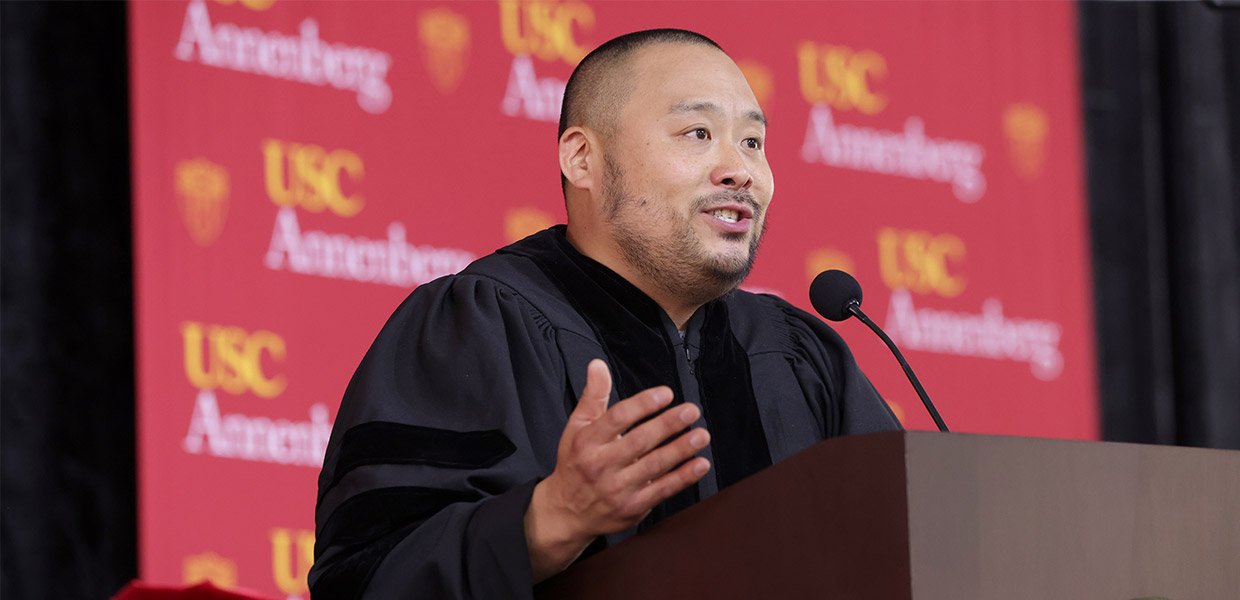Before David Chang earned the first of his two Michelin stars, received the first of his six James Beard Awards, or authored the first of his three New York Times bestsellers, he was a novice East Village restauranteur with a college degree in religious studies. Back then, in 2004, he was just getting the flagship Momofuku Noodle Bar off the ground.
Addressing new graduates of the USC Annenberg School for Communication and Journalism, Chang shared the story of a comforting moment during a difficult time. His father, visiting his dank apartment across the street from the restaurant, offered encouragement: “You’re going to make it.”
“It was because he could see I was all in,” Chang said. “No safety net. No distractions. Just me and this dream I wanted to be true. Every truth begins this way — as a possibility that must be tested.”
That word, “truth,” resounded throughout Chang’s remarks. With the snapshot from his humble beginnings, he urged the assembled Trojans to seek out their own personal truth with the confidence that their USC Annenberg education would benefit them wherever their passions should lead.
“Becoming a cook was my chance to find out what lies on the other side of fear,” he said. “And, as it turns out, studying religion proved to be extremely useful in the kitchen. It taught me to see the world beyond myself, and to search for shared connections between people with completely different beliefs.”
Since those days of difficulty, Chang has gained world renown as a chef, turned Momofuku into an innovative and well-known culinary brand, and more recently launched the entertainment company Majordomo Media. He addressed 1,344 doctoral, master’s and bachelor’s degree graduates in communication, journalism, public diplomacy and public relations, who gathered on May 12 at McCarthy Quad.
His key message was one of healthy skepticism and independent thought.
“My advice to you is to reject inherited truth,” he said. “Don’t take people’s word for it, and conversely, understand the power you’ve been given to shape others’ truth. Keep searching. Don’t be afraid to change your mind.”
Chang’s reflections on the concept of truth encompassed its slipperiness and the weight of subjectivity.
He led off his comments with a story about one of the New York Times cooking sections’ most popular recipes ever, his own instructions for a Korean pork dish called bo ssam, as served at Momofuku. He revealed that his dish both is and isn’t bo ssam. It’s a different cut of meat than the traditional version and varies in preparation and texture to suit the American palate.
He said: “My version of bo ssam is based on a true story, but it’s really more of a prank. … It’s one of the few real chances I’ve had in my career [as a chef] to affect people’s idea of what’s true.”
Chang emphasized the need for future media professionals to be mindful of the authority that their platforms will afford them.
“[Y]ou’re ostensibly here at this school because you’re interested in determining how people see the world. And as graduates of this esteemed institution, you’ve earned an incredible power to reveal and shape our truth.”
In an address from USC Annenberg Dean Willow Bay, she congratulated the school’s graduates for persevering through their studies.
“You’ve demonstrated truly remarkable grit and grace, fortitude and agility — I am sure learning so many more things than you thought you would,” she said. “We know you are well prepared for both the daunting challenges and enormous opportunities that lie ahead.”
Chang told the Class of 2023 that embracing fear can also be one such opportunity.
“We are too reverential of fear, whether it’s the fear of looking foolish or disappointing people, or the fear of saying you were wrong. It’s fine to be afraid, but it would be tragic to let it hold you back. … I encourage you to embrace fear. Learn the other side of the coin. Be entrepreneurial. …
“Nothing is wasted unless you fail to immerse yourself completely in the next thing.”
